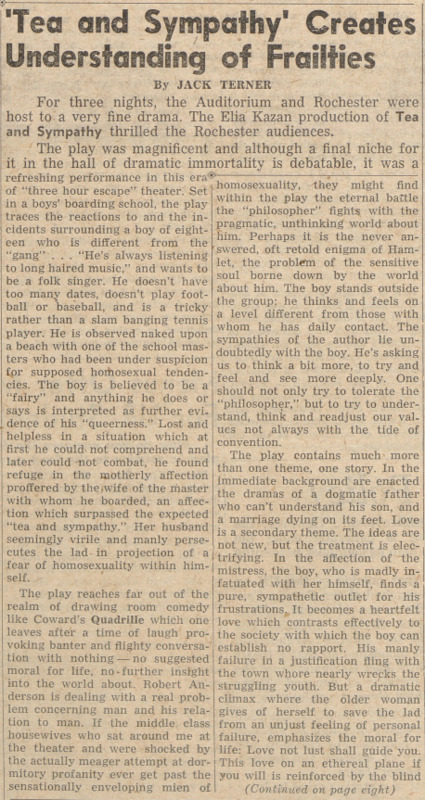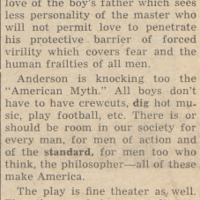'Tea and Sympathy' Creates Understanding of Frailties
Item
-
Title
-
'Tea and Sympathy' Creates Understanding of Frailties
-
Description
-
Review of a play focusing on themes of homosexuality. Possibly the first printing of 'homosexuality' in the Campus Times.
-
Creator
-
Campus Times
-
Date
-
1955-11-15
-
Format
-
Newspaper
-
Language
-
eng
-
Publisher
-
University of Rochester
-
Rights
-
This Item is protected by copyright and/or related rights. You are free to use this Item in any way that is permitted by the copyright and related rights legislation that applies to your use. For other uses you need to obtain permission from the rights-holder(s). http://rightsstatements.org/vocab/InC/1.0/
-
Source
-
Campus Times (November 15, 1955), Campus times (University of Rochester), LD4747.C197, Rare Books, Special Collections, and Preservation, River Campus Libraries, University of Rochester
-
Text
-
For three nights, the Auditorium and Rochester were host to a very fine drama. The Elia Kazan production of Tea and Sympathy thrilled the Rochester audiences.
The play was magnificent and although a final niche for it in the hall of dramatic immortality is debatable, it was a refreshing performance in this era of "three hour escape" theater. Set in a boys' boarding school, the play traces the reactions to and the incidents surrounding a boy of eighteen who is different from the "gang" . . . "He's always listening to long haired music," and wants to be a folk singer. He doesn't have too many dates, doesn't play football or baseball, and is a tricky rather than a slam banging tennis player. He is observed naked upon a beach with one of the school masters who had been under suspicion for supposed homosexual tendencies. The boy is believed to be a "fairy" and anything he does or says is interpreted as further evidence of his "queerness." Lost and helpless in a situation which at first he could not comprehend and later could not combat, he found refuge in the motherly affection proffered by the wife of the Master with whom he boarded, an affection which surpassed the expected "tea and sympathy." Her husband seemingly virile and manly persecutes the lad in projection of a fear of homosexuality within himself.
The play reaches far out of the realm of drawing room comedy like Coward's Quadrille which one leaves after a time of laugh provoking banter and flighty conversation with nothing — no suggested moral for life, no further insight into the world about. Robert Anderson is dealing with a real problem concerning man and his relation to man. If the middle class housewives who sat around me at the theater and were shocked by the actually meager attempt at dormitory profanity ever get past the sensationally enveloping mien of homosexuality, they might find within the play the eternal battle the "philosopher" fights with the pragmatic, unthinking world about him. Perhaps it is the never answered, oft retold enigma of Hamlet, the problem of the sensitive soul borne down by the world about him. The boy stands outside the group; he thinks and feels on a level different from those with whom he has daily contact. The sympathies of the author lie undoubtedly with the boy. He's asking us to think a bit more, to try and feel and see more deeply. One should not only try to tolerate the "philosopher," but to try to understand, think and readjust our values not always with the tide of convention.
The play contains much more than one theme, one story. In the immediate background are enacted the dramas of a dogmatic father who can't understand his son, and a marriage dying on its feet. Love is a secondary theme. The ideas are not new, but the treatment is electrifying. In the affection of the mistress, the boy, who is madly infatuated with her himself, finds a pure, sympathetic outlet for his frustrations. It becomes a heartfelt love which contrasts effectively to the society with which the boy can establish no rapport. His manly failure in a justification fling with the town whore nearly wrecks the struggling youth. But a dramatic climax where the older woman gives of herself to save the lad from an unjust feeling of personal failure, emphasizes the moral for life: Love not lust shall guide you. This love on an ethereal plane if you will is reinforced by the blind love of the boy's father which sees less personality of the master who will not permit love to penetrate his protective barrier of forced virility which covers fear and the human frailties of all men.
Anderson is knocking too the "American Myth." All boys don't have to have crewcuts, dig hot music, play football, etc. There is or should be room in our society for every man, for men of action and of the standard, for men too who think, the philosopher—all of these make America.
The play is fine theater as well. The theme of homosexuality is compelling in itself in this sex hidden-striving world of ours.




